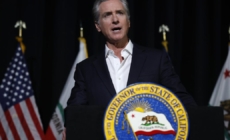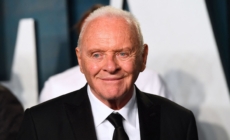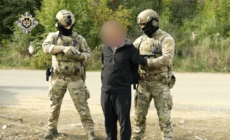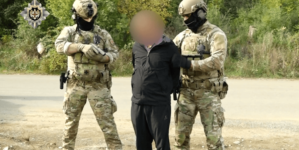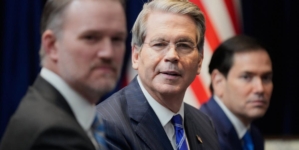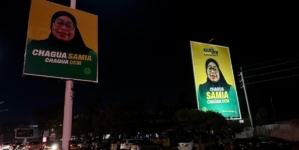-
George Kittle hauls in OUTRAGEOUS TD CATCH as 49ers chip away at Texans’ lead | NFL Highlights - 7 mins ago
-
Newsom, Harris both considering runs for president in 2028 - 19 mins ago
-
Anthony Hopkins reveals epiphany that ended his drinking 50 years ago - 21 mins ago
-
Daniel Cormier Reveals Backstage Details on Tom Aspinall’s Injury After UFC 321 - 27 mins ago
-
Giants' Jaxson Dart connects with Cam Skattebo for 18-yard TD, tying game vs. Eagles | NFL Highlights - 50 mins ago
-
Wild bear visits Sequoia Park Zoo in California, delights staff members - 57 mins ago
-
Most Young Democrats Still Back Graham Platner Despite ‘Nazi’ Tattoo: Poll - about 1 hour ago
-
Saquon Barkley rushes for 65-yard TD, giving Eagles early lead over Giants | NFL Highlights - 2 hours ago
-
Chinese Nationals Held in Georgia Over $400K Black-Market Uranium Plot - 2 hours ago
-
Tom Brady gives advice to Aaron Rodgers playing Packers & why he’s IMPRESSED with Jaxson Dart - 2 hours ago
Trump repeats claim he ended 8 wars, says no president has ever solved one
President Donald Trump repeated misleading claims about his peace-making efforts during a ceasefire ceremony between Thailand and Cambodia on Sunday.
“This is one of eight wars that my administration has ended in just eight months. We’re averaging one a month,” the president said during the event in Malaysia, saying it was unprecedented and would never happen again. Some analysts suggest his claims are exaggerated.
Trump also said that he didn’t think any other U.S. president had ever solved a war before. “They start wars, they don’t solve them,” he said.
Several of Trump’s predecessors have played a role in ending various conflicts, with Theodore Roosevelt becoming the first American to be awarded the Nobel Peace Prize in 1906 for his efforts in ending the Russo-Japanese War a year prior.
Newsweek has reached out to the White House via email for clarity on the president’s remarks.
Why It Matters
Trump’s renewed claims about ending eight wars come as he seeks to position himself as a global peacemaker and strengthen his case for a Nobel Peace Prize. By falsely portraying himself as the only U.S. president to have solved wars, Trump is emphasizing foreign policy achievements as a core part of his campaign message. Such statements will shape how voters and the international community assess his record on diplomacy and conflict resolution.
What To Know
The Trump administration has been involved in negotiating an end to the below eight conflicts. However, analysis from independent fact-checkers and international experts finds exaggerations and inaccuracies in the president’s claims:
- Israel-Hamas: Trump has described the Israel–Hamas truce and hostage exchange as his latest diplomatic breakthrough, calling it proof that he “ended” the war. In reality, while the ceasefire has paused fighting and allowed limited humanitarian access, the deal leaves major issues unresolved — including Hamas’ future role, the disarmament question, and the political control of Gaza. Analysts note that the truce is fragile and far from a comprehensive peace settlement.
- Israel-Iran: Trump is credited with ending the 12-day Israel-Iran war. After Israeli strikes on Iran’s nuclear facilities, Trump ordered U.S. airstrikes and negotiated a ceasefire. Analysts say his intervention stopped escalating hostilities, though tensions persist in what remains a fragile, ongoing cold conflict between the longtime regional rivals.
- Egypt-Ethiopia: Analysts agree there has been no armed conflict—only intense diplomatic disputes over the Grand Ethiopian Renaissance Dam, which are ongoing. No war was ended, and no formal peace deal has been signed.
- India-Pakistan: Tourist killings in Kashmir reignited India-Pakistan tensions before a ceasefire was reached. Trump claimed U.S. mediation and Pakistan praised him, though India denied any American role. Analysts believe Washington’s involvement helped calm the crisis, even if Trump’s influence wasn’t decisive and the conflict never escalated into full-scale war.
- Serbia-Kosovo: Though the Trump administration helped both sides agree to economic normalization during Trump’s first term, the two sides have not been at war during his second term. Tensions persist, and existing agreements have not led to a full reconciliation.
- Rwanda-Democratic Republic of the Congo (DRC): Although Trump played a key role in progressing the two countries towards peace, violence continues in eastern Congo, with ceasefires breaking down and armed rebel groups such as M23 remaining active.
- Armenia-Azerbaijan: In August, Trump hosted Armenia and Azerbaijan leaders at the White House to sign a deal easing decades of conflict over Nagorno-Karabakh. The agreement reopens transport routes and sets groundwork for a peace treaty, though final ratification is pending. Both sides cautiously pursue normalization after years of recurring clashes.
- Cambodia-Thailand: Trump pressured Cambodia and Thailand to accept a ceasefire after border clashes left several soldiers wounded. Malaysia mediated, but progress came only after Trump tied future U.S. trade deals to peace. Economic pressure helped end the brief summer conflict, restoring calm between the Southeast Asian neighbors.
Historians note that several U.S. presidents have ended or helped resolve wars—among them Dwight D. Eisenhower, who ended the Korean War; Jimmy Carter, who brokered peace between Egypt and Israel; Bill Clinton, who helped end the Bosnian War; and Barack Obama, who oversaw the end of the Iraq combat mission.
What People Are Saying
Evelyn Farkas, executive director of Arizona State University’s McCain Institute, said Trump deserved recognition for ending the hostilities between Iran and Israel: “There’s always a chance it could flare up again if Iran restarts its nuclear weapons program, but nonetheless, they were engaged in a hot war with one another…And it didn’t have any real end in sight before President Trump got involved and gave them an ultimatum.”
On India and Pakistan, she said: “I think that President Trump played a constructive role from all accounts, but it may not have been decisive. And again, I’m not sure whether you would define that as a full-blown war.”
Lawrence Haas, a senior fellow at the American Foreign Policy Council, said of Egypt and Ethiopia: “It would be a gross overstatement to say that these countries are at war…I mean, they’re just not.”
Ken Lohatepanont, a political analyst and University of Michigan doctoral candidate, said Trump’s involvement in the conflict between Thailand and Cambodia was crucial: “President Trump’s decision to condition a successful conclusion to these talks on a ceasefire likely played a significant role in ensuring that both sides came to the negotiating table when they did.”
What Happens Next
While there’s no doubt that Trump and his administration have played a role in brokering ceasefires and facilitating dialogue between conflicting countries, experts believe that these agreements are fragile and provisional. Many of the conflicts remain unresolved or volatile, with ongoing violence or stalled negotiations.
This article contains reporting from The Associated Press
Source link

